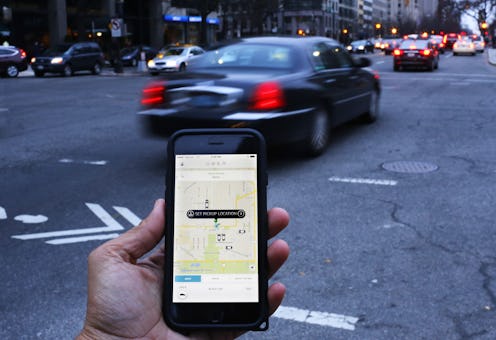News
Four Times Uber Totally Messed Up
Poor Uber. In a July campaign speech at the New School in New York City, 2016 Democratic front-runner Hillary Clinton came down hard on companies like Uber, citing these companies' unwillingness to name drivers under its program as "employees" to avoid requirements that would force it to provide benefits and insurance. And given the company's spotty history with the courts, she might have a point: A quick sift through the annals of Internet archives alone produces plenty of times Uber apparently did the wrong thing in order to maintain its simplicity. (An aide for Clinton, Jake Sullivan, noted after Clinton's comment that Clinton did not have an issue with Uber specifically — rather, that Uber and companies like it raise "hard questions," Reuters reports.)
"This on-demand or so called 'gig economy' is creating exciting opportunity and unleashing innovation, but it’s also raising hard questions about workplace protections and what a good job will look like in the future," Clinton said. "Fair pay and fair scheduling, paid family leave, earned sick days, and child care are essential to our competitiveness and growth."
Aside from Uber's insistence on denying its drivers "employees status" (drivers are referred to officially as "contractors"), the transportation network has played host to a number of other disappointing — and sometimes tragic — incidents over the years.
"Back in 2012, Paul Carr first raised serious concerns about the company’s view that both riders and drivers are disposable commodities in an all-out Randian battle to maximize profits," wrote PandoDaily's Sarah Lacy in an exposé last November. "Then, in 2014, Carmel DeAmicis exposed that an Uber driver accused of assault had a criminal record that should have been uncovered by the background checks Uber claimed to do [...] further document[ing] a 'blame the passenger' culture at the company when such complaints came up."
Not that Lacy was ever in the wrong for calling Uber out on its oft-concerning practices. Over the years, there have been a number of times that Uber has crossed the line.
When Uber Apparently Tried To Skirt Responsibility For A Child's Death
On New Year's Eve in 2013, 6-year-old Sofia Liu was crossing the street with her family in San Francisco when she was struck by an Uber driver and killed. In a brazen attempt to ward off law enforcement questions, the company initially (and swiftly) denied any liability over Liu's death, claiming that the driver in question was not logged into the Uber system at the time of the accident. Eventually, the company seemed to bend to questions over its user accountability when it was discovered that the driver had, in fact, been logged into the system. Uber awarded an unspecified sum to the Liu family for their troubles this month.
When CEO Travis Kalanick Allegedly Called His Company "Boober"
According to GQ writer Mickey Rapkin, Uber CEO Travis Kalanick once referred to his company as "Boober" due to the amount of women soliciting him for sex since his star first started rising.
Not to make assumptions, but Kalanick probably wasn't the first kid in his class to lose his virginity. But the way he talks now — which is large — he’s surely making up for lost time. When I tease him about his skyrocketing desirability, he deflects with a wisecrack about women on demand: Yeah, we call that Boob-er.
Gross.
When Employees Allegedly Played "Ding-Dong Ditch" With Uber's Competitors
Uber's, well, "uber-rival" Lyft has accused the rideshare company of purposefully sabotaging its business by scheduling and later canceling over 5,500 separate appointments over the years, backing up their claims with data that they allege shows dirty business practices — you know, the sort that a pre-pubescent teen might engage in. Uber has denied this. CNN Money reported in August 2014:
Bogus requests decrease Lyft drivers' availability, which could send users to Uber instead. But it's not just the company that suffers. Canceled rides jeopardize income that Lyft drivers depend on — plus they spend time and gas money en route to passengers who have no intention of taking a ride.
When Executive Emil Michael Allegedly Suggested Ruining The Lives Of Journalists As A Legitimate Line Of Defense
Remember that time Sarah Lacy accused Uber exec Emil Michael of threatening to ruin her because she wrote about his company in a less than satisfactory light? According to BuzzFeed's Editor-in-Chief Ben Smith, Michael's supposedly done it before. During an industry dinner in Manhattan last November, Smith alleged Michael "suggested that the company should consider hiring a team of opposition researchers to dig up dirt on its critics in the media" and that he was allegedly planning on sifting through various journalists' "personal lives and ... families."
Smith also said Michael believed he was off the record when he wasn't. When contacted by BuzzFeed for comment, Michael later denied the accusations through a spokeswoman and assured Smith that he would not target any particular columnists with whom he took issue.
Whether Clinton knew of the alleged faulty business practices that have been circling the so-called arrogant company since its inception and rise in popularity is uncertain. Already, her rivals on the GOP side of the aisle have criticized her statements as archaic, with Kentucky Sen. Rand Paul dissing her words as poorly constructed advice "from someone who has been driven around in a limo for 30 years" in a series of tweets on Monday.
But there's no denying that Uber has a real problem, and whether that lies in its inability to provide fair work benefits to its employees or its arrogant disconnect with reality, journalism, or women, it's a fair assumption that unless it decides to change its executive attitude, the company's reputation won't be riding high for much longer.
Images: Getty Images (4)
